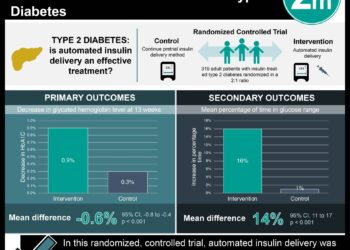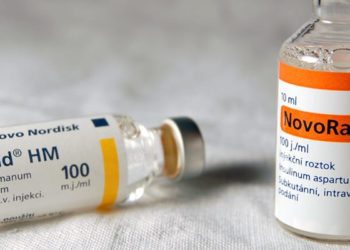Quick Take: Continuous Subcutaneous Insulin Infusion Versus Multiple Daily Injection Regimens in Children and Young People at Diagnosis of Type 1 Diabetes
Multiple daily injections (MDI) and continuous subcutaneous insulin infusion (CSII) are two forms of intensive insulin regimens utilized by patients with type 1 diabetes. Here, MDI and CSII are compared in terms of their safety, efficacy, and cost in the first year after a diagnosis of type 1 diabetes. This randomized controlled trial and economic evaluation enrolled 294 patients across multiple centers in England and Wales. Patients with a new diagnosis of type 1 diabetes between the ages of 7 months and 15 years were randomized to receive either MDI or CSII within 14 days of diagnosis. Titration occurred according to local clinical practice. Researchers found that glycated hemoglobin (HbA1c) at 1 year was not significantly different between the CSII and MDI arms (mean difference 2.4 mmol/mol, 95% CI -0.4 to 5.3, p=0.09). Additionally, there was no significant difference in the proportion of patients achieving a HbA1c less than 58 mmol/mol. Parents reported an improvement in quality of life scores with CSII, as compared to MDI, however, children did not. Additionally, CSII was more expensive by $2,474 per year (95% CI $2,116 to $2,792) and was not associated with a significant difference in incremental cost per quality adjusted life year (difference -0.006, 95% CI -0.031 to 0.018). Investigators therefore concluded that there was no glycemic control benefit to CSII, as compared to MDI, in the first year after a diagnosis of type 1 diabetes, despite it being more expensive.
Click to read the study in BMJ
Image: PD
©2019 2 Minute Medicine, Inc. All rights reserved. No works may be reproduced without expressed written consent from 2 Minute Medicine, Inc. Inquire about licensing here. No article should be construed as medical advice and is not intended as such by the authors or by 2 Minute Medicine, Inc.







